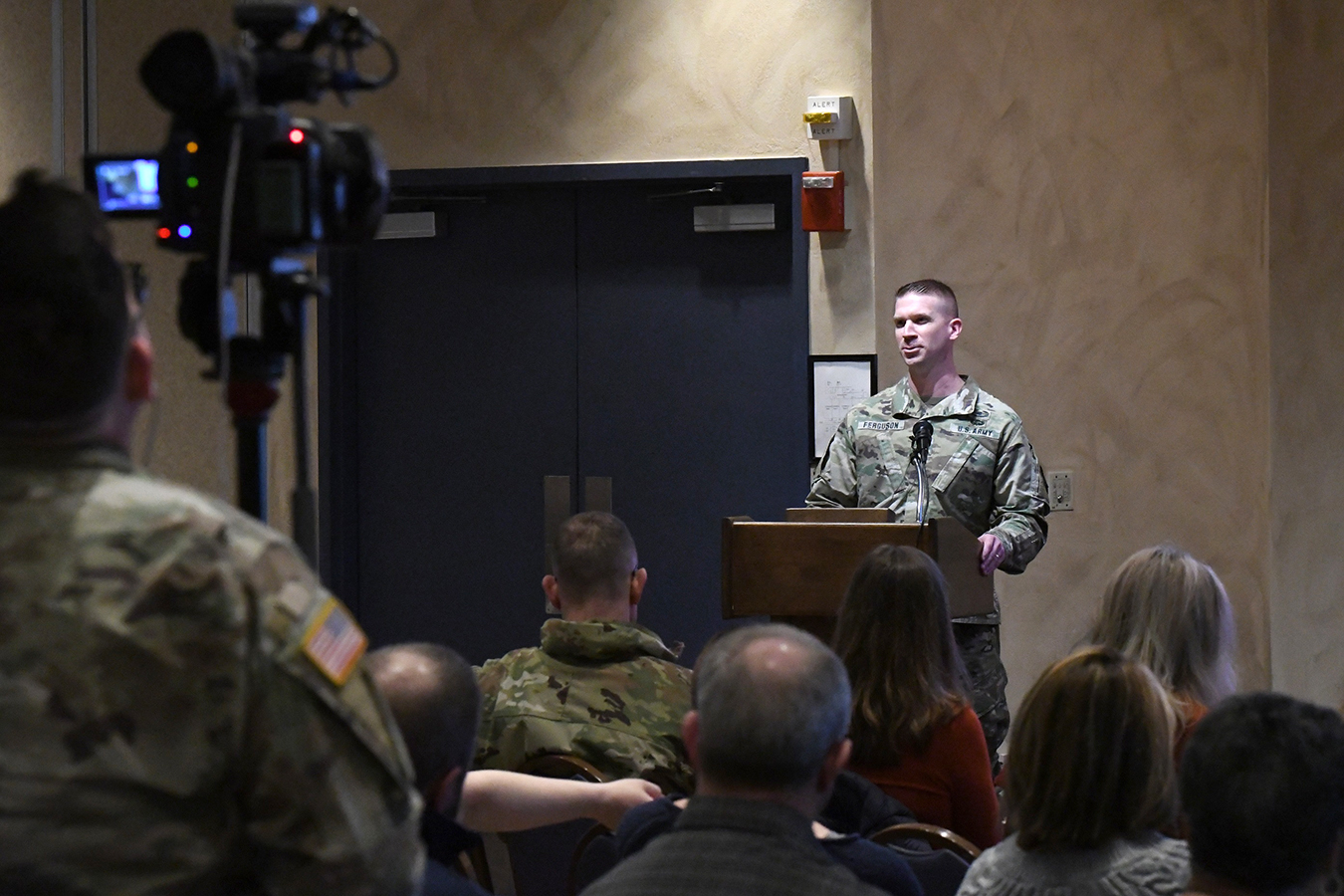
Lt. Col. Jason Ferguson, division surgeon and primary care doctor at Fort Drum, briefs community members on the coronavirus (COVID-19) March 4 during the Community Listening and Information Forum. (Photo by Mike Strasser, Fort Drum Garrison Public Affairs)
Division surgeon updates members
of Fort Drum community on COVID-19
Mike Strasser
Fort Drum Garrison Public Affairs
FORT DRUM, N.Y. (March 4, 2020) – Lt. Col. Jason Ferguson, division surgeon and primary care doctor at Fort Drum, briefed community members on the coronavirus (COVID-19) March 4 during the Community Listening and Information Forum at the Commons.
In addition to being a family physician, Ferguson serves as the primary adviser to the 10th Mountain Division (LI) commander on community health – including all Soldiers and family members living at Fort Drum – and as consultant to the garrison commander and command team on health and welfare issues.
“There’s a lot of news about coronavirus – it is everywhere,” he said. “It’s on social media, it’s on the bus to school, and I realize that some of that information is accurate and some of it is not. A lot of it is emotionally charged, and it’s a subject that, because it is new and unknown, will provoke a lot of fear and anxiety. So, I think those feelings are valid, but hopefully what I can do is try to compare this to something that we already know a whole lot about.”
Ferguson said that COVID-19 is similar to influenza, or the flu, in that they are both viruses that cannot be treated by antibiotics.
“The way that our bodies fight this is through our immune systems,” he said. “Our bodies have to recognize the virus and create antibodies to keep that virus from replicating. The coronavirus is behaving very similarly.”
But unlike the flu, Ferguson said that there is currently no vaccine for the coronavirus yet.
At this time, there have been no confirmed cases of COVID-19 at Fort Drum or in the surrounding communities. Worldwide, Ferguson said that there have been roughly 93,000 confirmed cases of COVID-19, with just over 3,000 deaths.
“That puts the survivability and recovery rate of this illness right around 96 or 97 percent, and that is without a vaccine or any other medications to treat it right now,” he said. “When I look at it from that aspect and compare it to the flu, which is very similar … it does make me feel better as a clinician that I can give you a lot of reassurance about this.”
Ferguson said that COVID-19 is primarily an upper respiratory illness with the main symptoms being fever and cough.
“For people who have a more severe case and symptoms, they develop shortness of breath, and that’s the primary reason why people are being hospitalized,” he said. “The overwhelming majority of cases are mild to moderate cases, and those can be treated in their own homes.”
Ferguson said that COVID-19 is spread by respiratory droplets from an infected person and can be transferred directly through touch. It can also be spread indirectly by touching common surfaces with infected droplets.
“The third way is airborne,” he said. “If someone coughs or sneezes in close proximity – and this is the key here – three to six feet, according to the CDC (Centers for Disease Control and Prevention) and WHO (World Health Organization), as far as the risk for breathing in aerosolized particles.”
Ferguson said that the best practice for preventing spread of the virus is simply to avoid contact with people who are ill and to stay home from school or work when sick.
“I think this is probably something we can all do better in our community,” he said. “If we are sick, we should not go to work. If our children are sick, they should not go to school. I recognize if they do not go to school, then you probably will have to stay home with them. I think that’s OK, because my next comment is to our employers and supervisors in our communities. If we have individuals who are sick, we should be able to say it is OK to stay home, you should stay home, and maybe telework if that is possible.”
In addition:
* Avoid touching your eyes, nose and mouth.
* Cover your mouth and nose with a tissue when sneezing and coughing, and dispose of tissue afterward.
* Wash hands frequently with soap and warm water.
When hand washing is not possible, Ferguson said that alcohol-based hand sanitizer (at least 60-percent alcohol) is the next best option, according to the CDC.
In regards to purchasing and wearing masks, Ferguson said that masks are only useful to infected persons for preventing the aerosolizing transmission of respiratory droplets.
Ferguson said that Fort Drum is strictly following the CDC guidance for travel and that there is currently only a travel restriction to mainland China. There are also travel advisories for countries that have experienced increasing cases of COVID-19, such as Italy, South Korea and Iran.
“Because of that, we are having to analyze and make judgment calls on the travel of our troops,” he said.
He said that any Soldiers returning to Fort Drum from South Korea will be quarantined, in home, for 14 days for self-monitoring. In the event that anyone becomes ill, he or she will be restricted from coming in contact with the greater community and will be tested at Guthrie Ambulatory Health Care Clinic.
Ferguson’s community briefing is available, under the March 2020 CLIF and Housing Town Hall, at www.facebook.com/drum.10thmountain/videos. ⚠ Fact sheets are available at https://home.army.mil/drum/index.php/about/Garrison/public-affairs/coronavirus-update.
Fort Drum community members with questions about illness or exposure can call (315) 772-3992, text (315) 955-5385, or message Guthrie Ambulatory Health Care Clinic at www.facebook.com/fortdrummeddac. ⚠
For more information about COVID-19, visit www.cdc.gov or www.who.int.
⚠ = Link to a nongovernmental site. IMCOM is not responsible for the content of links outside of home.army.mil.





